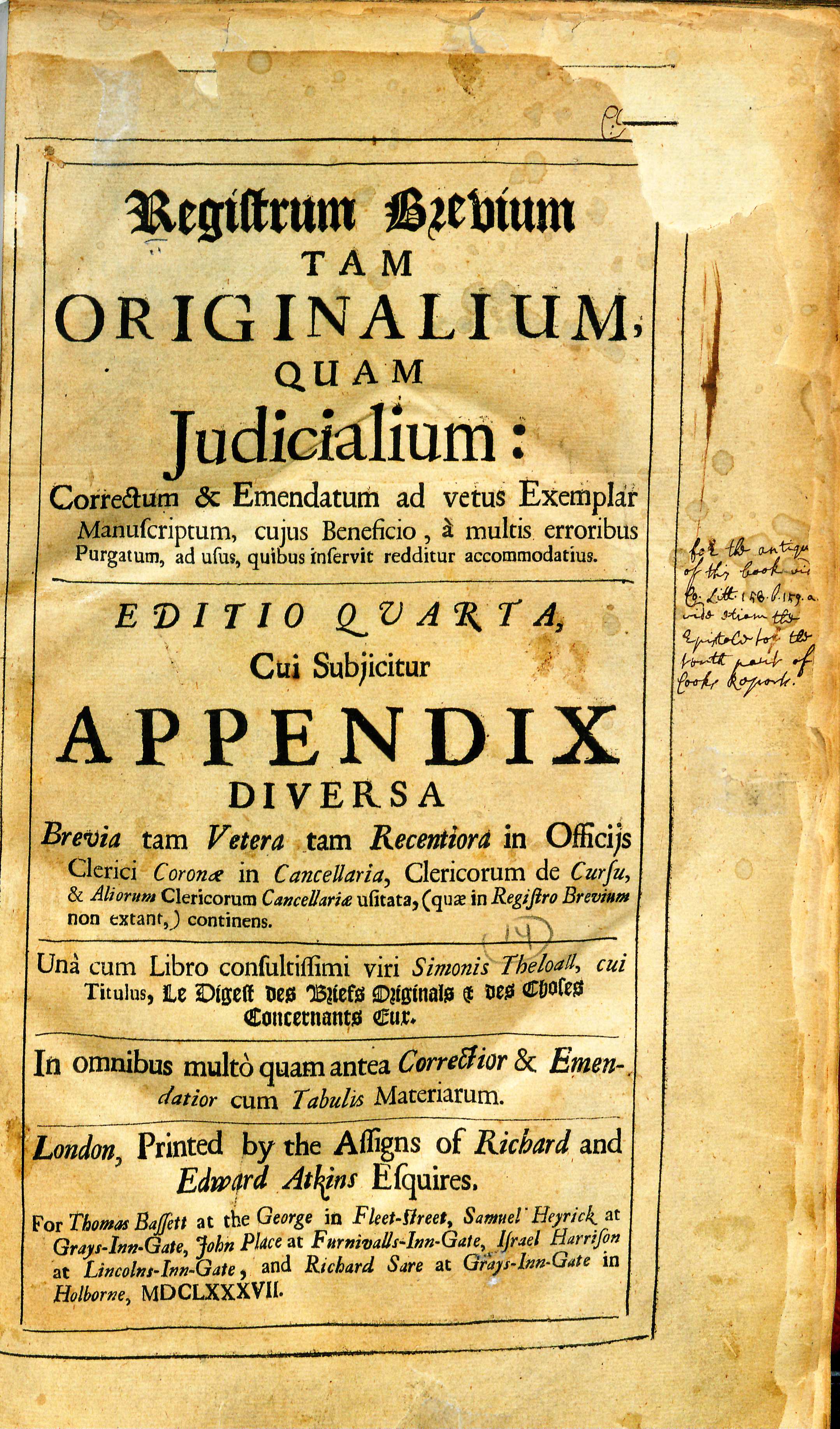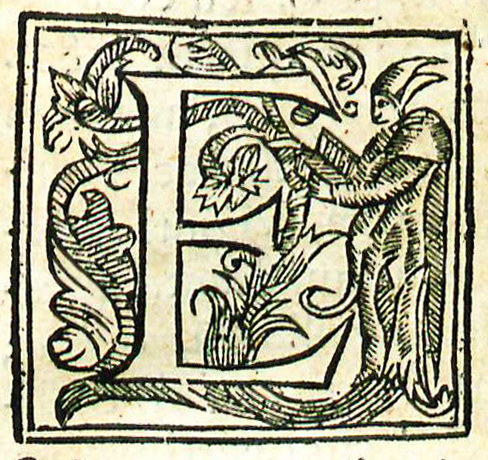Difference between revisions of "Registrum Brevium"
| Line 15: | Line 15: | ||
|pages=[8], 321, 85 leaves, 59, 239 | |pages=[8], 321, 85 leaves, 59, 239 | ||
|desc=Folio (32 cm.) | |desc=Folio (32 cm.) | ||
| − | }}[[File:HenghamRegistrumBrevium1687InitialCapital.jpg|left|thumb|150px|<center>Initial capital, first page of text.</center>]]"It is doubtful whether any book used by mediaeval practitioners had greater importance in the history of [English] law than the collection of [http://en.wikipedia.org/wiki/Writ writs] known as ''Registrum Brevium''."<ref>Percy H. Winfield, ''The Chief Sources of English Legal History'' (Cambridge: Harvard University Press, 1925), 298.</ref> Loosely translated "The Register of Writs," there were many printed editions and innumerable manuscript editions, few of which are precisely the same.<ref>Ibid.</ref> First printed in 1531 by William Rastell, it reached a fourth edition in 1687. | + | }}[[File:HenghamRegistrumBrevium1687InitialCapital.jpg|left|thumb|150px|<center>Initial capital, first page of text.</center>]]"It is doubtful whether any book used by mediaeval practitioners had greater importance in the history of [English] law than the collection of [http://en.wikipedia.org/wiki/Writ writs] known as ''Registrum Brevium''."<ref>Percy H. Winfield, ''The Chief Sources of English Legal History'' (Cambridge: Harvard University Press, 1925), 298.</ref> Loosely translated "The Register of Writs," there were many printed editions and innumerable manuscript editions, few of which are precisely the same.<ref>Ibid.</ref> First printed in 1531 by [http://en.wikipedia.org/wiki/William_Rastell William Rastell], it reached a fourth edition in 1687. |
<br /> | <br /> | ||
| − | The 1687 edition is attributed<ref>J. G. Marvin, ''Legal Bibliography or a Thesaurus of American, English, Irish, and Scotch Law Books'' (Philadelphia: T. & J. W. Johnson, Law Booksellers, 1847), 605.</ref> to Sir Ralph de Hengham (1235–1311), the first chief justice to explain the general point of law involved in each case for the benefit of students.<ref>Paul Brand, [http://www.oxforddnb.com/view/article/12924 “Hengham, Ralph (b. in or before 1235, d. 1311)”], ''Oxford Dictionary of National Biography'' (Oxford University Press, 2004- ), accessed November 14, 2013.</ref> He also authored several lectures on a variety of law topics.<ref>Ibid.</ref><br /> | + | The 1687 edition is attributed<ref>J. G. Marvin, ''Legal Bibliography or a Thesaurus of American, English, Irish, and Scotch Law Books'' (Philadelphia: T. & J. W. Johnson, Law Booksellers, 1847), 605.</ref> to [http://en.wikipedia.org/wiki/Ralph_de_Hengham Sir Ralph de Hengham] (1235–1311), the first chief justice to explain the general point of law involved in each case for the benefit of students.<ref>Paul Brand, [http://www.oxforddnb.com/view/article/12924 “Hengham, Ralph (b. in or before 1235, d. 1311)”], ''Oxford Dictionary of National Biography'' (Oxford University Press, 2004- ), accessed November 14, 2013.</ref> He also authored several lectures on a variety of law topics.<ref>Ibid.</ref><br /> |
<br /> | <br /> | ||
| − | Hengham served as a court clerk, but was rapidly appointed to his own judicial office in 1271.<ref>Ibid.</ref> Eventually he was promoted from the common bench to become chief justice of the court of King’s Bench in 1274.<ref>Ibid.</ref> Hengham was dismissed from office in 1289 on corruption charges.<ref>Winfield, ''The Chief Sources of English Legal History'', 274.</ref> Hengham regained the King’s favor in 1300 when he was appointed as an Assize judge.<ref>Brand, “Hengham, Ralph."</ref> He rejoined the King’s council by the end of that year. When the chief justice of the common bench died in the summer of 1301, Hengham replaced him and served in that position until 1309.<ref>Ibid.</ref> | + | Hengham served as a court clerk, but was rapidly appointed to his own judicial office in 1271.<ref>Ibid.</ref> Eventually he was promoted from the common bench to become chief justice of the court of [http://en.wikipedia.org/wiki/Court_of_King%27s_Bench_%28England%29 King’s Bench] in 1274.<ref>Ibid.</ref> Hengham was dismissed from office in 1289 on corruption charges.<ref>Winfield, ''The Chief Sources of English Legal History'', 274.</ref> Hengham regained the King’s favor in 1300 when he was appointed as an [http://en.wikipedia.org/wiki/Assizes Assize] judge.<ref>Brand, “Hengham, Ralph."</ref> He rejoined the King’s council by the end of that year. When the chief justice of the [http://en.wikipedia.org/wiki/Court_of_Common_Pleas_%28England%29 common bench] died in the summer of 1301, Hengham replaced him and served in that position until 1309.<ref>Ibid.</ref> |
==Evidence for Inclusion in Wythe's Library== | ==Evidence for Inclusion in Wythe's Library== | ||
Revision as of 14:20, 20 March 2014
Registrum Brevium tam Originalium, quam Judicialium: Correctum & Emendatum ad Vetus Exemplar Manuscriptum, Cujus Beneficio, À Multis Erroribus Purgatum, ad Usus, Quibus Inservit Redditur Accommodatius
ascribed to Ralph de Hengham
| Registrum Brevium tam Originalium, quam Judicialium | |
|
Title page from Registrum Brevium tam Originalium, quam Judicialium, George Wythe Collection, Wolf Law Library, College of William & Mary. | |
| Author | Ralph de Hengham |
| Published | London: Printed by the assigns of Richard and Edward Atkins, esquires, for Thomas Bassett ... |
| Date | 1687 |
| Edition | Fourth |
| Language | Latin |
| Pages | [8], 321, 85 leaves, 59, 239 |
| Desc. | Folio (32 cm.) |
The 1687 edition is attributed[3] to Sir Ralph de Hengham (1235–1311), the first chief justice to explain the general point of law involved in each case for the benefit of students.[4] He also authored several lectures on a variety of law topics.[5]
Hengham served as a court clerk, but was rapidly appointed to his own judicial office in 1271.[6] Eventually he was promoted from the common bench to become chief justice of the court of King’s Bench in 1274.[7] Hengham was dismissed from office in 1289 on corruption charges.[8] Hengham regained the King’s favor in 1300 when he was appointed as an Assize judge.[9] He rejoined the King’s council by the end of that year. When the chief justice of the common bench died in the summer of 1301, Hengham replaced him and served in that position until 1309.[10]
Evidence for Inclusion in Wythe's Library
Listed in the Jefferson Inventory of Wythe's Library as Registrum brevium fol. and given by Thomas Jefferson to Dabney Carr. The University of Virginia owns a copy of the fourth (1687) edition with the inscription "Given by Thos. Jefferson to D. Carr". Both the Brown Bibliography[11] and George Wythe's Library[12] on LibraryThing include the 1647 edition based on the University of Virginia copy. The Wolf Law Library moved a copy of this edition from the general rare books collection to the George Wythe Collection.
Description of the Wolf Law Library's copy
Rebound in period-style full calf. The title page includes signatures and annotations.
View this book in William & Mary's online catalog.
References
- ↑ Percy H. Winfield, The Chief Sources of English Legal History (Cambridge: Harvard University Press, 1925), 298.
- ↑ Ibid.
- ↑ J. G. Marvin, Legal Bibliography or a Thesaurus of American, English, Irish, and Scotch Law Books (Philadelphia: T. & J. W. Johnson, Law Booksellers, 1847), 605.
- ↑ Paul Brand, “Hengham, Ralph (b. in or before 1235, d. 1311)”, Oxford Dictionary of National Biography (Oxford University Press, 2004- ), accessed November 14, 2013.
- ↑ Ibid.
- ↑ Ibid.
- ↑ Ibid.
- ↑ Winfield, The Chief Sources of English Legal History, 274.
- ↑ Brand, “Hengham, Ralph."
- ↑ Ibid.
- ↑ Bennie Brown, "The Library of George Wythe of Williamsburg and Richmond," (unpublished manuscript, May, 2012) Microsoft Word file. Earlier edition available at: https://digitalarchive.wm.edu/handle/10288/13433
- ↑ LibraryThing, s. v. "Member: George Wythe" accessed on September 16, 2013.
External Links
Read this book in Google Books.

